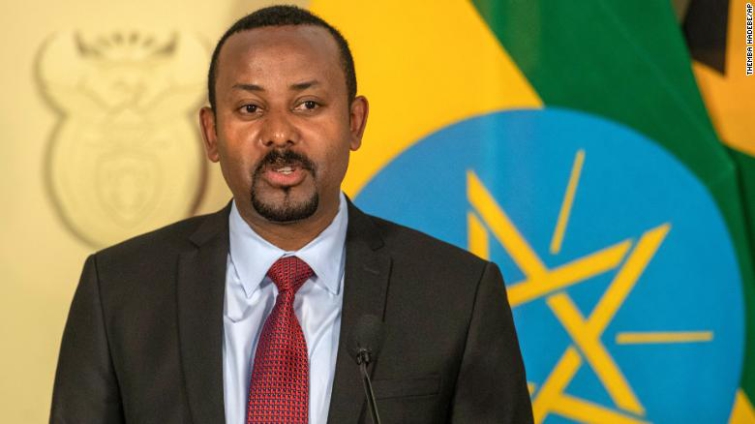Ethiopia's prime minister stepped up a military offensive in the northern region of Tigray on Sunday with air strikes as part of what he called a "law enforcement operation," increasing fears of outright civil war in Africa's second-most populous country.
Abiy last week launched a military campaign in the province, saying forces loyal to leaders there had attacked a military base and attempted to steal equipment. Abiy accuses the leaders of Tigray of undermining his democratic reforms.
Government fighter jets have since been bombing targets in the region, which borders Sudan and Eritrea. Aid workers on Sunday reported heavy fighting in several parts of the region, with at least six dead and dozens wounded.
Also on Sunday, Abiy named a new chief of the army, a new intelligence chief and a new federal police commissioner and foreign minister, changes that analysts said brought close allies into top posts as the conflict escalates.
The premier won last year's Nobel Peace Prize for making peace with neighboring Eritrea and for introducing democratic reforms in one of Africa's most repressive countries.
But the democratic transition he promised is endangered by the Tigray conflict, the International Crisis Group think-tank warned last week.In a televised address on Sunday, Abiy urged the international community "to understand the context and the consistent transgressions" by the Tigrayan leaders which led the government to undertake "this law enforcement operation."
Tigrayans complain that Abiy, who is from the Oromo ethnic group, Ethiopia's largest, has unfairly targeted them as part of a crackdown on past rights abuses and corruption.Forces of the Tigray People's Liberation Front (TPLF), which governs the region, are battle-hardened and possess significant stocks of military hardware, experts say.
They and militia allies number up to 250,000 men, according to the International Crisis Group.One of the biggest risks is that Ethiopia's army will split along ethnic lines, with Tigrayans defecting to the regional force. There are signs that is already happening, analysts said.
The United Nations raised concerns of reprisals against ethnic Tigrayans amid heightened tension in the diverse country in a confidential report dated Sunday and seen by Reuters.
Addis Ababa Police Commissioner Getu Aregaw said Sunday that the government had arrested 162 people in possession of firearms and ammunition, on suspicion of supporting the Tigrayan forces.
The suspects were "under investigation," he said in a statement. He did not identify their ethnicity. The mayor of the capital, Adanech Abiebie, said on Saturday several TPLF members working in her administration had been arrested on suspicion of planning to disrupt the peace. As Abiy's government mobilizes troops to send to Tigray, other parts of the country roiled by ethnic violence could face a security vacuum, analysts say.
Latest Stories
-
Soldier, 2 others in court for alleged robbery
7 minutes -
Telecel reacts to GH¢2 million lawsuit over alleged unauthorized use of Makola woman’s picture
8 minutes -
U.S. government donates 10 liquid oxygen plants to GHS
10 minutes -
33 million posts analysed since 2022 as FIFA marks International Day for Countering Hate Speech
26 minutes -
Delinquency and infraction fees have been there since 2012 – DVLA boss
26 minutes -
Diana Hamilton to walk the runway in debut fashion showcase
28 minutes -
Let’s scrap protocol arrangement – DVLA boss
36 minutes -
Stanchart announces GH₵1.6704 per share dividend for shareholders
56 minutes -
TOR’s revival: Will implementing an OILBOARD initiative the answer?
1 hour -
Kotoko present FA Cup trophy to Life Patron Otumfuo Osei Tutu II
1 hour -
Failure to re-open local bond market, others to weigh on Ghana’s rating – Fitch
1 hour -
FA charge Chelsea’s Mudryk with doping offences
1 hour -
Embrace transformative ESG ambition – KPMG urges businesses
2 hours -
Makola onion seller sues Telecel for GH¢2 million over privacy breach
2 hours -
“I’m not going to cast just because I’m looking for new faces” – Shirley Frimpong-Manso
2 hours

